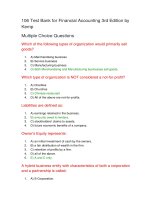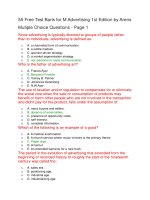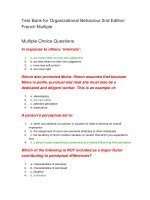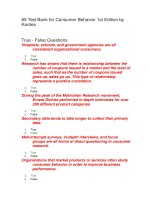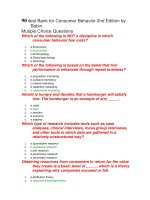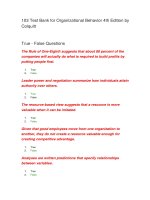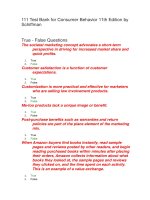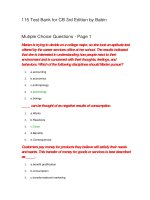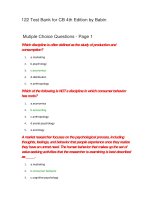90 test bank for marketing management 1st edition by iacobucci
Bạn đang xem bản rút gọn của tài liệu. Xem và tải ngay bản đầy đủ của tài liệu tại đây (101.04 KB, 16 trang )
90 Test Bank for Marketing Management 1st Edition by
Iacobucci
Multiple Choice Questions
In each chapter you will see _____ over and over again
1.
2.
3.
4.
a. consequentialism ethics
b. marketing terminology
c. the 5Cs, STP, and 4Ps
d. marketing concepts
Due to marketing’s success in business, what do manageme
nt gurus think about marketing’s role in a company?
1.
2.
3.
4.
a. they think its role is to direct sales
b. it takes no special skill to be a good marketer anymore
c. that it’s not just a function anymore
d. it’s the most important aspect
What is today’s marketplace focused more on?
1.
2.
3.
4.
a. business
b. customers
c. product
d. price
What order is correct for the marketing framework?
1.
2.
3.
4.
a. 5Cs, 4Ps, STP
b. 4Ps, 5Cs, STP
c. 5Cs, STP, 4Ps
d. STP, 5Cs, 4Ps
What is the result companies see from happier customers
due to marketing?
1.
2.
3.
4.
a. Companies are less profitable
b. Companies market less
c. Companies are more profitable
d. Companies see no results
If you ask the average person, “What is marketing?,” one of t
he things you might hear is:
1.
2.
3.
4.
a. Marketing is sales and advertising
b. Marketing is fun
c. Marketing is the backbone of all business
d. Marking is not profitable
The outcome orientation perspective of ethics is called ____.
1.
2.
3.
4.
a. psychological
b. philosophical
c. deontological
d. consequentialism
What is one of the largest factors stressing out marketers
these days?
1.
2.
3.
4.
a. the pressure increase stock price
b. the pressure to prove they are valuable
c. the pressure to show results
d. the pressure to produce more money than R&D
A company’s marketing executives should assess the _____
in terms of a general analysis of a business problem or
opportunity the company is facing.
1.
2.
3.
4.
a. business situation
b. 5Cs
c. STP
d. ARA
Marketing is thought to be evidence of an evolved ____.
1.
2.
3.
4.
a. society
b. business
c. customer
d. market
The questions and issues that the reader can expect to
understand better in each chapter is revisited at the
end of the chapter in a list format called _____.
1.
2.
3.
4.
a. Managerial Recap
b. Managerial Checklist
c. Question Recap
d. Marketing Recap
What is marketing NOT all about?
1.
2.
3.
4.
a. finding out what customers like
b. providing what customers like
c. making a profit
d. organizing the structure of a business
What can be marketed?
1.
2.
a. vacation destinations
b. professional athletes
3.
4.
c. just about anything
d. clothes
Which of the following is defined to be an exchange between
a firm and its customers?
1.
2.
3.
4.
a. advertising
b. consumer behavior
c. marketing
d. finance
What did the early marketplace primarily focus on?
1.
2.
3.
4.
a. product
b. promotion
c. price
d. place
The marketing framework can be used when you’re ____.
1.
2.
3.
4.
a. buying a car
b. working on a case for class
c. trying to decide where to eat lunch
d. doing your taxes
The question, “Will customers want what your company is pr
epared to produce?,” best describes with of these
4Ps?
1.
2.
3.
4.
a. product
b. price
c. place
d. promotion
One reason marketers want to quantify how effective their
programs are is to show that they increase profits. The
other reason marketers want to quantify their
effectiveness is to _____.
1.
2.
3.
4.
a. try to raise their rank among the function
b. have a seat at the table with the CEO, CFO, etc.
c. be able to direct sales
d. make more effective promotions
Great marketing is based on ______ laws of human and
organization behavior.
1.
2.
3.
4.
a. philosophical
b. feelings about
c. intuitive
d. economic and psychological
The book gives a clear knowledge of marketing at both the
strategic and conceptual level as well as the ____.
1.
2.
3.
4.
a. virtual level
b. tactical, hands-on level
c. lower level
d. psychological level
Advertising's goal is to enhance _____.
1.
2.
3.
4.
a. brand image
b. profit
c. marketing
d. purchases
Which of the following is NOT part of the 5Cs?
1.
2.
3.
4.
a. context
b. customer
c. corporation
d. competitors
If companies are good and if they’re lucky, the exchange con
tinues iterating between the customer and the
company, ___________ the tie between them.
1.
2.
3.
4.
a. strengthening
b. weakening
c. distracting
d. exhausting
Which of the following is NOT a question that each chapter
in the textbook answers?
1.
2.
3.
4.
a. Why does it matter?
b. What is the topic in this chapter?
c. How do I do this?
d. What do you need to do to market your own business?
_____ and _____ are the central players in the marketing
exchange.
1.
2.
3.
4.
a. Context, customer
b. Collaborator, competitor
c. Context, company
d. Customer, company
The 4Ps include all of the following EXCEPT:
1.
2.
a. positioning
b. price
3.
4.
c. product
d. place
Marketers help/work with all of the following EXCEPT:
1.
2.
3.
4.
a. athletes
b. hotels
c. department stores
d. pets
Great marketing is NOT ____.
1.
2.
3.
4.
a. soft
b. economic
c. logical
d. psychological
A company has its best chance at keeping its customers hap
py if it’s in close ____ with them.
1.
2.
3.
4.
a. context
b. communication
c. cooperation
d. support
The process orientation perspective of ethics is called ____.
1.
2.
3.
4.
a. psychological
b. philosophical
c. deontological
d. consequentialism
Which of the following is NOT a part of STP?
1.
2.
3.
4.
a. segmentation
b. positioning
c. targeting
d. All are part of STP
The textbook will assume that _____ will be used for data
intake in a company.
1.
2.
3.
4.
a. experts
b. the Internet
c. polls
d. focus groups
What is the best way to stay 5 steps ahead of the
competition?
1.
2.
3.
a. focus on profits
b. remain customer centric
c. focus on what the CEO wants
4.
d. study the competition
Each chapter in the textbook answers what question?
1.
2.
3.
4.
a. Which of the 5Cs is covered in this chapter?
b. What is the topic in this chapter?
c. What makes a great marketer?
d. What do you need to do to market your own business?
Marketing can make customers happier, which makes
companies ____.
1.
2.
3.
4.
a. more profitable
b. less vulnerable
c. more operational
d. more ductile
Marketers try to figure out what __________ want and then
they try to figure out how to provide it and make
money doing so.
1.
2.
3.
4.
a. business owners
b. customers
c. advertisers
d. companies
What do the letters CMO represent?
1.
2.
3.
4.
a. Chief Management Officer
b. Central Marketing Organization
c. Central Management Officer
d. Chief Marketing Officer
The textbook uses the ____ over and over so that you will
pick it up by osmosis.
1.
2.
3.
4.
a. marketing background
b. customer model
c. 5Cs, STP, and 4Ps
d. Maslow model
Why do accounting and finance need to acknowledge the
importance of marketing?
1.
2.
3.
4.
a. because marketing generates sales
b. because the CEOs do
c. because marketing generates buzz
d. because a monopoly is the only way to make a profit
Fundamentally, the best marketers put themselves in the
place of their _____.
1.
2.
3.
4.
a. company
b. customers
c. competitors
d. friends
True - False Questions
Most companies perform the marketing function easily.
1.
2.
True
False
If you ask the average person, “What is marketing?” you mig
ht hear something like, “Marketers make people buy
stuff they don’t need and can’t afford.”
1.
2.
True
False
Marketing shows the evolution of markets. This is the
change from an industry just having production and
sales to having true relationships with its customers.
1.
2.
True
False
Some things that can be marketed include goods, services,
experiences, events, and people.
1.
2.
True
False
In order for marketing to have an equal vote in company
decisions, it needs to quantify the effectiveness of
marketing programs. All other departments in a
company translate progress into financial terms, and
marketing needs to do this as well.
1.
2.
True
False
These days we live in a truly product-oriented and productempowered marketing world.
1.
2.
True
False
The outcome orientation style of ethics is called
deontological ethics.
1.
2.
True
False
You’ll always be a step ahead of your competition if you sim
ply think about your company.
1.
2.
True
False
Great marketing is based on sound, logical—emotional and p
hysical—laws of human and organization behavior.
1.
2.
True
False
Customers typically do not mind paying for purchases, if
they like what they are purchasing.
1.
2.
True
False
Marketing will both enhance your career and make the world
a better place.
1.
2.
True
False
The 5Cs, STP, and 4Ps diagram is used at the beginning of
every chapter so that students can see a framework
depicting how all the marketing pieces come together
to form the whole picture.
1.
2.
True
False
Many management gurus believe that marketing has succee
ded so well that it really isn’t a function in an
organization anymore.
1.
2.
True
False
When you try to find out how customers vary in their prefere
nces, needs, and resources you are in the “Targeting”
phase of STP.
1.
2.
True
False
John, an MBA student, finds the textbook useful because
each chapter is organized by a framework that shows
how all the marketing pieces come together to form
the whole picture.
1.
2.
True
False
The term “market” sounds like it involves selling simple, tan
gible goods, but as you know, hardly anything can be
marketed.
1.
2.
True
False
Marketers help athletes, celebrities, and politicians with their
images in their respective marketplaces (to fans and
agents, intelligentsia, or the public).
1.
2.
True
False
Most companies would agree that taking in profits is much
more important than keeping customers happy.
1.
2.
True
False
There are many contingencies that modify marketing plans.
1.
2.
True
False
The 5Cs, STP, and 4Ps operate interdependently.
1.
2.
True
False
Meredith owns a consulting firm that advises on intellectual
property. She would hire a marketer but she doesn’t
because you cannot market a consulting firm.
1.
2.
True
False
Marketing is defined as an exchange between a firm and its
customers.
1.
2.
True
False
In an exchange, the customer wants something from the
company but the company wants nothing from the
customer.
1.
2.
True
False
John just purchased a new Honda Civic from the local Honda
dealership. Even though John was happy and Honda
made a profit, this was not a symbiotic relationship.
1.
2.
True
False
Pfizer does not use direct-to-consumer ads to push their
pharmaceutical drugs, as it is unlikely patients will ask
their doctor for a particular brand name.
1.
2.
True
False
Marketers are under a lot of pressure to show results. There
are a lot of marketing activities for which results can
be measured.
1.
2.
True
False
A context question in a situational analysis might be: “What i
s happening in our industry that might reshape our
future business?”
1.
2.
True
False
“How do I do this—show me what to do so I can be successf
ul!,” is one of the issues that is covered in each
chapter of the textbook.
1.
2.
True
False
Optimal business solutions should reflect a complete
knowledge of how the 5Cs, STP and 4Ps change with
changes in customers, competitors, and the legal
environment.
1.
2.
True
False
Sara works for a golf products company. In order for Sara to
best answer the question, “What do my customers
want?,” she plays golf and tries out the equipment.
1.
2.
True
False
Angela, who owns her own green cleaning service, is a
marketer when she promotes her business to new
clients.
1.
2.
True
False
John is a marketer for Verizon. He puts together sales
promotions and advertisements for a new cell phone.
He is applying the “product” part of the 4Ps.
1.
2.
True
False
Marketing can be used to educate the public.
1.
2.
True
False
Diana is the marketing vice president at Company ABC. As
she assesses any particular business problem or
opportunity in terms of general analysis, she should
review the 5Ps.
1.
2.
True
False
One of the factors currently stressing marketers is the
pressure to show results.
1.
2.
True
False
A marketer for the American Heart Association would be
responsible for their push of the message to eat foods
lower in fat.
1.
2.
True
False
R&D people don’t understand marketing because they are to
o concerned with making the latest and greatest
invention.
1.
2.
True
False
Marketing management is the overseeing of the processes of
the 5Cs, STP, and 4Ps components.
1.
2.
True
False
Marketers try to figure out what customers want and then
they try to figure out how to provide it and make
money doing so.
1.
2.
True
False
STP stands for segmentation, targeting and positioning.
1.
2.
True
False
Free Text Questions
Why is it important not to go overboard on effects to quantify
marketing’s results? Describe why segmentation
strategy and advertising’s results should not be over a
nalyzed.
Answer Given
If you go overboard to quantify marketing’s results, you will get skewed results of
reality. For example, suppose you are trying to asses the value of a segmentation
strategy. If the segments are poorly defined, then the results of the segmentation
study may not be accurate. Also, it is difficult to measure the results of advertising
in the short term. The main goal of advertising should be to enhance brand image,
and that takes a lot longer than short-term sales.
List and describe the 5Cs.
Answer Given
The 5Cs are customer, company, context, collaborators, and competitors. These
Cs help us assess any particular business problem or opportunity in terms of a
general analysis of the entire business situation. The customer and company are
obviously the central players in the marketing exchange. The context includes
things like the macroenvironment: How are our economy and that of our suppliers
doing? What legal constraints might we face? What cultural differences do our
global segments manifest? The collaborators and competitors are the companies
and people we work with vs. those we compete against, although drawing the line
is sometimes difficult in today’s global, networked economy.
Define STP and explain how it influences the marketing
process.
Answer Given
STP stands for segmentation, targeting, and positioning. The STP part of
marketing
refers to the fact that we are very unlikely to be all things to all people, so it’s best
to identify groups, or segments, of customers who share similar needs and wants.
Once we understand the different segments’ preferences, and we presumably can
identify our own company’s strengths, we can identify the segment we should
target with our marketing efforts. We then strike up a conversation and relationship
with that target segment by positioning our product to them in the marketplace via
the 4Ps.
List at least 5 categories of items that can be marketed.
Answer Given
- tangible goods like soap or cereal; - high-end items like jewelry; - services like
hotels and restaurants; - experiences like theme parks; - people, like athletes and
politicians; - a town or city; causes; for example, a nonprofit’s goal; - yourself; for
example, in an interview
Describe the evolution of marketing.
Answer Given
At first marketing was simply product or production-focused. Over time, simply
building a better version of a previous product was not good enough. Marketers
had to start really listening to their customers and providing what they wanted. In
today’s age, companies seek a true relationship with their customers instead of jus
t trying to sell them something.
Describe the main layout of the textbook.
Answer Given
The textbook focuses on how a product benefits customers. The textbook
presents on a global basis because the world is running on a global scale due to
the Internet. The textbook trains you to think like a marketer. Marketing is based
on logical, measurable behavior, not art or intuition. The textbook teaches you how
to think about marketing in a scientific way.
Define marketing’s exchange relationship.
Answer Given
Marketing is defined to be an exchange between a firm and its customers. The
customer wants something from the firm, and the firm wants something from the
customer. Marketers try to figure out what customers want and then they try to
figure out how to provide it and make money doing so.
Describe how different functions in a business interact with
marketing, and why they should understand
marketing.
Answer Given
- Accounting and finance need to understand the importance of marketing
because the CEO does. With competition you always need to be thinking about
your customers; - Sales people understand marketing. They know that if their
company makes products the customer wants, their job will be easier; - R&D
people appreciate marketing because they know they if their inventions become
popular and sell, they will have success.
List and describe the 4Ps.
Answer Given
The 4Ps are product, price, promotion, and place. A marketer's responsibilities are
to create a product that customers are likely to need or want; price the product
appropriately; promote it via advertising and sales promotions to help customers
understand the product’s benefits and value; and make the product available for
purchase in easily accessed places.
List 3 of the 5 main points from this chapter.
Answer Given
- marketing is customer focused and it should be profitable : - marketing is a
relationship between customers and a company; - anything can be marketed; - the
marketing framework is based on the 5Cs, STP, 4Ps; - if you remain customercentric you will stay ahead of the competition
